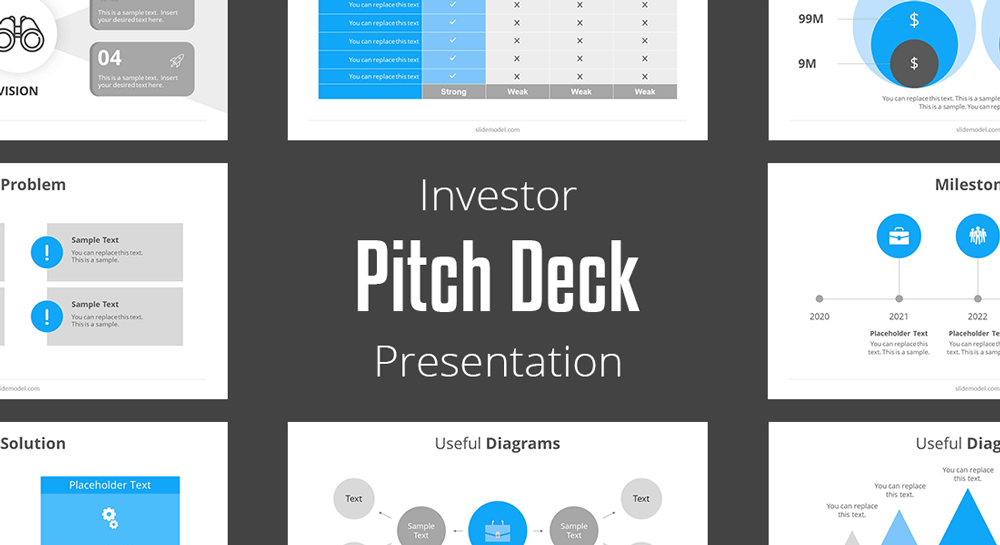June 23, 2020
How To Create A Pitch Deck: Tips For A Good Pitch Deck
An idea is a genesis for future entrepreneurs in the vast business landscape. The bridge between the implementation of this idea and the development of a product that sells is titanic. Luckily, a Pitch Deck acts as an interagent and comes to your rescue.
Whether you are a dilettante or a well-established businessperson, making a pitch deck is your silver bullet. This article will give you a detailed insight into how to build a pitch deck for your product. So, if you are a budding tycoon, seeking the most effective way to get your product into the industry, keep reading to learn how to make a pitch deck that gets funded!

Table of content
What Is a Pitch Deck?
What is a pitch deck? A pitch deck is a presentation put together by entrepreneurs when looking for a chain of financing from investors. You will generally present your pitch deck online or via person-to-person meetings with potential stakeholders, co-founders, and partners. Simply put, a good pitch deck is the masterpiece of an artist.
If you seek to raise capital for your business, creating a lucrative pitch deck that steals the show is a crucial component of your fundraising apparatus. The key factor that sets an average pitch deck apart from a top one is whether it can make a hard-hitting impact or not. In a world where product launches are almost beating the speed of light, a pitch deck is your ride-or-die chance at incurring profit with flying colors!
The success of every new product in the market calls for an elaborate gig. The rule is simple; if you want yours on a pedestal, you have to put your best foot forward to advocate it. This is where a pitch deck comes into play. It acts as bait to lure potential investors and interest them in a conversation regarding your business, hopefully resulting in investment.
How Does a Pitch Deck Help?
Pitching your product to a chamber filled with investors is highly exhausting. Furthermore, presenting an average pitch deck to flatter them is no less than taking a knife to a gunfight! However, with an ideal pitch deck, you can tie up potential investors’ attention long enough to demonstrate the specifics of your product and why it is a profitable investment.
You might be wondering, “Why should I even bother? My product will do all the talking.”
Did you know that around 90% of startups fail, often due to monetary issues? Getting an early investment in your company can save your cruise from sinking. After all, the survival and failure of your business startup pivot on a single step.
There is no denying the fact that investing in a business is eternally risky. Investors are unsure whether you will be relevant in the coming years. Therefore, to lock their buy-in during the initial phases, you need to prepare a killer pitch deck.

A Guide to Preparing the Greatest Pitch Deck for Your Product
How to make a good pitch deck:
A guide to preparing top pitch deck for your product
Behind every pitch deck, there is a concoction of tried-and-tested steps to back it up. Now, let us further navigate into the fool-proof formula that every entrepreneur must include in his/her pitch deck for the success of their next funding presentation!
There are three keys to prepare pitch deck that gets funded:
- Compelling
- Crisp and clear-cut
- Easy to act on
According to research conducted by DocSend, on average, investors employ 3 minutes and 44 seconds to each pitch deck they receive. Therefore, it all comes down to less than 4 minutes to make a long-lasting impression. So, how to write a pitch deck for your product the right way?
Each slide of your pitch deck must be comprehensible and sway the investor before they jump onto the next one. Hence, it is up to you to make every second and every slide count. Broadly speaking, pitch decks do not and must not carry more than 19 slides. Luckily, we’ll get the job done in just 10! Take a look at our collection of pro tips for a good pitch deck:
Slide 1 – Vision and the value proposition
This is the curtain opening of your pitch deck. Visual presentation is important and should be representative but laconic. Basically, the first slide acts as a cover that demonstrates a quick overview of your product, and the value that you intend to provide to your customers. It must include a concise layout with your company’s name, tagline, and logo. This slide might be on the screen for long, even before you begin with the presentation. Therefore, consider it as the best performer on your stage.
Pro tip: A wise way to make the best out of this slide is to consider it as a Twitter feed — describe your product/business within 140 characters. Additionally, to make a statement, you can go creative with your value proposition by setting it against well-established companies. For instance, you may have witnessed many taglines that begin with:
“We are the Netflix for podcasts,” or “We are the Amazon for your daily needs.”
This would be a great tool to illustrate your value proposition. However, at the same time, make sure that your comparison with such high-profile companies does not appear as if you are shooting arrows in the dark.
Slide 2 – The problem
What is the point of using a product? To solve a problem. If you are not solving a global problem, your business endeavor will have a tiresome uphill climb to success. You can devote the second slide to discuss the problem you will be solving, in addition to those who struggle with it (your target audience). Pinpoint these areas by reviewing your buyer personas.
Pro tip: Ideally, try to recite a relatable tale while defining the problem. The more your problem appears real, the more your investors will be able to resonate with it, thus understanding your product and your business.
Slide 3 – Your target audience
Use this slide to define your ideal customer. You may want to expand on the following factors in your slide:
- How many target customers are there?
- What is the market size that is relevant to your product?
- How do you position yourself in the industry?
These are the three questions that investors seek answers to. If you can manage to field these questions, the cards are already in your favor! You can use this slide to describe the scale and scope of the problem in slide 2.
Pro tip: Divide your market into segments, and list how you will address each of them. However, steer clear of any temptation to define your market larger than it is. Remember, the more definitive you are, the more pragmatic your pitch will be.

Slide 4 – The solution
Now, you can plunge into the specifics of your service or product. Just like a yin and yang, the problem and its solution go hand-in-hand. Illustrate how your audience will use your product to solve the problem mentioned above. This is a classic storytelling method wherein you build the problem, depict its influence on the market, and portray your product as a hero!
Pro tip: Hold the spotlight on your customers and the problems they face. Creating a pitch deck try to fixate it on this format to tell a gripping story.
Slide 5 – Stretch out the business model
After describing your product, the next step is to elucidate how it makes money. Flesh out information on the lines of the following questions:
- What do you charge?
- Who pays all the bills?
- Are you a high-grade, premium offering or an economical offering that undercuts pre-existing market solutions?
Pro tip: Cite the competitive landscape in this slide, and explain how your pricing corresponds to the wider market.
Reach out to us for crafting a user-centric app that is worth a thousand downloads!
Get in touchSlide 6 – Roadmap to validation
This slide is to dive into the details if you have already incurred early users for your product. Most investors do not flinch an inch with mouth-advertisement. They need a proven testimony to validate their investment. After all, they are under a cloud of risk as well. Therefore, use evidence (a Minimum Viable Product) to certify the workability of your solution.
Pro tip: Depict your milestones, major goals achieved, and further steps for the futuristic growth of your business.
Slide 7 – Marketing strategy to fuel your service
List out strategic marketing models to get the audience’s attention, in addition to elaborating on your sales process. Exhibit the key tactics that you will use to get your product on the centre stage. Investors know that winning customers can come off as a humongous challenge for a business. Therefore, it is essential to show your protocol to reach your target market.
Pro tip: List out the sales channels you will use. Ensure that your marketing strategy is one that the investors haven’t already heard of. With immense competition in the market, you do not want them to dump your product beneath the ground.
Slide 8 – Introduce the team
Highlight the essence of your team. They are the “secret sauce” to your business. Let them know your strengths, and why your team can get their investment to sky-scraping heights. The experiences, achievements, and expertise, showcase everything on the table!
Pro tip: Locate the key positions in the team that are critical to your service.
Slide 9 – Chronicles of the financials
Investors expect to review your financials before investing in your product. These include your income statement, cash flow forecast, and sales forecast. Make the use of graphics and charts to display the statistics of your finances.
Pro tip: Gear yourself to discuss the investors’ underlying inferences. Remember to be realistic at all costs. Do not chase “hockey stick” projections to avoid investors cutting on your projections.
Slide 10 – Appeal for investment
Finally, when you learned the secret how to prepare pitch deck to get seed funding, it’s time to actually ask for the money – the sole aim behind your pitch deck. After you acquaint your potential investors with reasons why they should invest in your product, you need them to know the amount of funds you are looking for. Remember, this is your golden opportunity to seal the deal!
Pro tip: Develop a well-planned model that illustrates how you will use their money and how it will aid you in achieving your business goals.

Interexy’s Experience in Making Pitch Decks
Interexy is a software development company with years of experience in implementing great mobile app ideas. Having handled numerous meetings with investors, we have gathered some helpful insights on how to create a pitch deck that will most likely get your project funded.
From our experience, we can say that a pitch deck should not exceed 19 slides and be too wordy. Another common mistake we have observed is using jargon and abbreviations since your investors might not be familiar with them. Further, many startups tend to underestimate their competition during the pitch. This is not a good technique as you do not know your potential investors, their knowledge, preferences, and connections. Finally, make sure your pitch deck is up-to-date and contains professional graphics and layout.
At Interexy, our best experts will educate you about different ways of funding, help you prepare for a pitch, and guide you through the most suitable options. Here are some of the most common sources of funding in the tech industry:
Accelerators support startups, mostly tech startups, by providing mentorship as well as offering funding. However, accelerators do not accept just anyone to their program. You will have to demonstrate that your idea is viable and feasible. The most well-known accelerators are TechStars, AngelPad, and Y Combinator, and they ask for equity in exchange for their investment.
Upon receiving the initial funding, we will help you move to the next step and explore further investment options like crowdfunding, venture capitalists, etc.
Final Takeaway
The ideal pitch deck is a one-man army that tells your story without you being the narrator. Investors might want to go through the deck multiple times. Therefore, make sure that you leave no stones unturned to prepare a booming pitch deck for your product! We hope that you are well-versed with the formula for preparing a pitch deck for your business. Entrepreneurs, it’s time to hone your skills and get going!

















